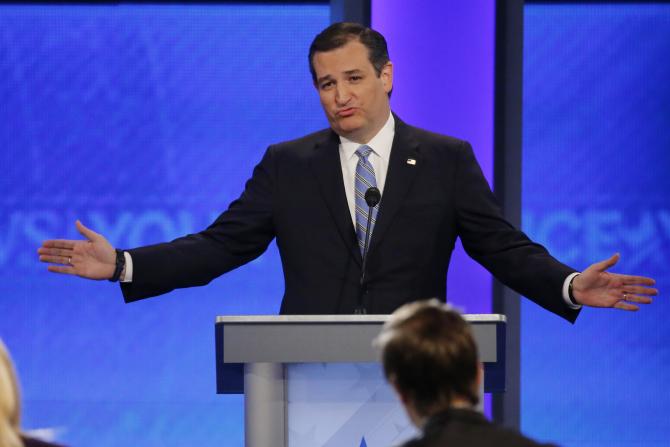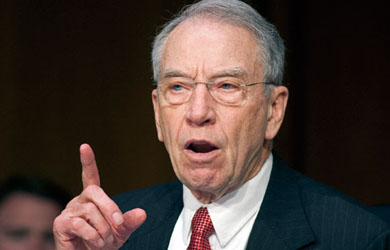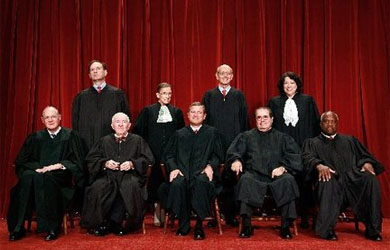John McCain is planning to be in North Carolina tomorrow where he is scheduled to give a speech on judicial nominations:
John McCain’s campaign said Friday that Fred Thompson and Sam Brownback will join the presumptive GOP nominee in North Carolina next week for a major speech on judicial appointments.
Both Thompson and Brownback have endorsed the Arizona senator, and both Republicans presented themselves throughout the Republican primary battle as “consistent conservatives,” particularly regarding social issues and judicial appointments.
The speech, to be held Tuesday at Wake Forest University in Winston-Salem, will be just one element of a broader outreach to conservatives next week, according to the campaign.
McCain is expected to discuss the kinds of judges he would appoint up and down the federal bench.
Why he is doing this on the day of the Democratic primary in the state is hard to understand. Perhaps he is hoping to work his way into the press coverage … or perhaps he is hoping to keep a rather low profile while he delivers remarks designed solely to, once again, assure the GOP’s right-wing base that he’ll appoint justices like John Roberts and Samuel Alito to the Supreme Court without attracting too much attention from the media.
Either way, he’s probably hoping that the press won’t bother to actually write about his record on judges as exemplified by, say, his 1987 support of Robert Bork [PDF]:
I would like to explain why I am going to vote of favor of confirmation [of Robert Bork], and why I do so without any hesitation … I believe that what the Senate should appropriately examine in a nominee are: Integrity and character, legal competence, and philosophy and judicial temperament. I believe Robert Bork is well qualified in all four respects … Judge Bork’s honesty, integrity, and diligence are above reproach … [he] demonstrates that he is not some intellectual “loose cannon on deck,” or a quixotic maverick jurist , but is a thoughtful, reasonable, jurist … [he] is hardly a radical, but is rather a very thoughtful judge in synch with the vast majority of his colleagues on the bench.
…
First, and most importantly, is the question of Judge Bork’s view of the role of the judiciary. Judge Bork is clearly a believer in judicial restraint. He believes that the courts should not create social policy or arbitrate social policy disputes unless the Constitution clearly speaks to the issues. He believes that in our republican form of government such decisions are properly left to legislatures elected by the people, not Federal judges appointed for life. I have no problem with that view, because I wholeheartedly agree with it.
…
I have no problem with my colleagues voting against Bork if they truly believe he is unfit for the Supreme Court – although I personally cannot conceive of how you could reach that conclusion … I believe Robert Bork will be an outstanding Justice and contributor on that Court … Robert Bork deserves our support and will be a great Supreme Court Justice.
In his endorsement, McCain delivered a lengthy defense of Bork’s controversial views, stating that Roe v. Wade is “the clearest example of judicial ‘legislation'” and that the rules it set out are “nonsense.” Nor did McCain appear to be a fan of the right to privacy, stating that it was entirely “created by Justice Douglas in the Griswold case.”
Joining McCain will be Fred Thompson, who shares McCain’s affinity for Justices like Roberts and Alito and is already out making the pitch for McCain on the issue of judges, and Sen. Sam Brownback, who endorsed McCain after his own presidential campaign folded in the early-going, in part to help pay off his campaign debt, but also because he was promised that he “would play an advisory role in helping decide who he should nominate for the Supreme Court.” That undoubtedly appealed to Brownback because, as he repeatedly stated when he was campaigning, he wanted nothing more than “to be the president that appoints the justice that’s needed vote to overturn Roe vs. Wade.” While he won’t get that opportunity to do that directly, advising McCain on Supreme Court nominations will still allow him to play an important role in finding a Supreme Court nominee that will finally eliminate the right to choose.








